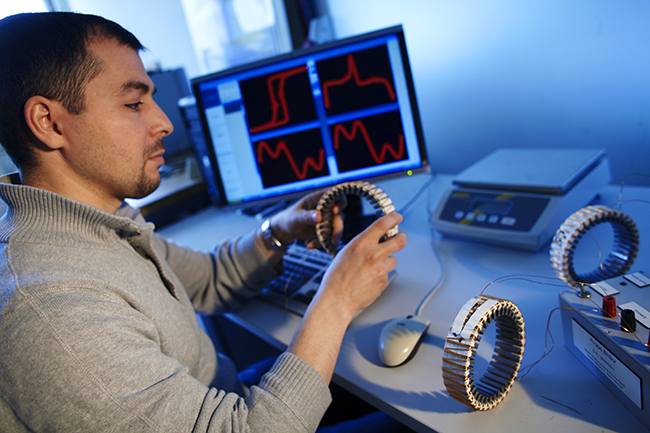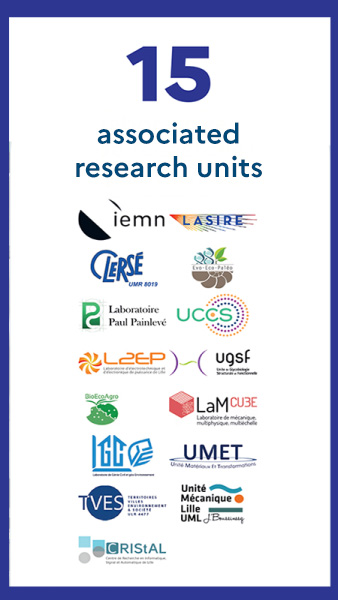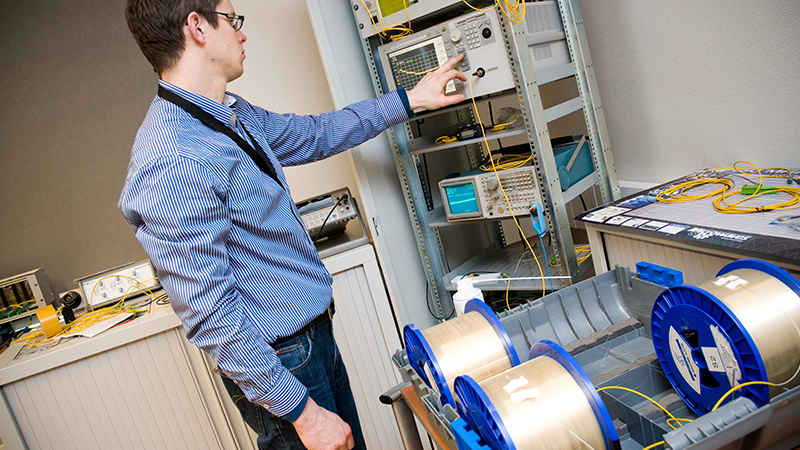
Research
Research and research environment at Polytech Lille.
Polytech Lille is located is located in a large scientific and technical pole which has more than 40 accredited research units.
The university’s research is organized around various entities : research units, shared structures and platforms. It is also involved in major facilities such as national and international research infrastructures and facilities of excellence (Equipex +).
The researchers and PhD students of the university work on various aspects of the theme “transition”, with recognized excellence in 4 research strands (hubs) : Hub Planet, Hub Healthe, Hub Digital, Hub Societies.

The University of Lille is collaborating with its national, regional and local scientific partners :
- National Institute of Healthcare and Medical Research (Inserm),
- National Institute for Research in Digital Science and Technology (Inria)
- Lille University Hospital (CHU Lille),
- Institut Pasteur de Lille
- National Centre for Scientific Research (CNRS)
The Welcoming Internationals to Lille (WILL) project, led by the University of Lille and its partners, aims to support the international development strategy of the Lille site, as part of the Programme d’investissement d’avenir (PIA), funded by the French government.
A strong link between training, research and innovation
The dynamic link between training, research and innovation is based on the research activities of our faculty members, the development of new teaching methods and the professionalization of our courses
Polytech Lille is associated with 15 research units of the University of Lille :

- BioEcoAgro : Biological engineering applied to agriculture, biotechnology, agri-food and the environment
- CRISTAL : Computer science, signal and automatic control : covers many digital science thems, from the most theoretical to the most applied (artificial intelligence, cybersecurity, digital health, robotics)
- EEP : Origin and evolution of biodiversity and paleo-biodiversity
- Paul Painlevé Laboratory : Basic and applied research in Mathematics,
- CLERSÉ : Sociology, economics, anthropology and demography
- IEMN : Electronics, microelectronics and nanotechnology
- L2EP : Electrical engineering and power electronics
- LaMcube : Multiscale and multiphysics mechanics
- LASIRE : Spectroscopy for interactions, reactivity and environment
- LGCgE : Civil engineering and geo-environment
- TVES : Territories, cities, environment & society
- UCCS : Catalysis and solid-state chemistry
- UGSF : Structural and functional glycobiology
- UMET : Materials and transformations
- UML : Fluid mechanics and mechanics of materials and structures
The expertise of the school’s faculty members covers a wide spectrum of engineering sciences.
Engineering and ecological transition
The school is committed to supporting the energy transition engineering component of the University of Lille’s Contract of Objectives, Means and Performance, in the industrial transformation of the Hauts-de-France region.
- Professor Wan Yu Tsai's "Materials for Energy Storage" chair
- COMASYS "From Materials to Systems" interdisciplinary energy continuum project
Developing innovative and secure digital technologies
Digital technologies are profoundly transforming the way we work and care. The school’s faculty members carry out research based on the University of Lille’s priority programs and themes of excellence.
- Professor Jean Emmanuel Clément's “Hyperspectral Microscopy and Data Science for Biomedical Imaging” Chair
eight technology platforms, a Fab lab and a Food Lab

Each platform concentrates in a specific field of engineering sciences, all the material resources, equipment and competences :
- Agrifood
- Electronics, Electrotechnics, Instrumentation
- Civil engineering
- Materials Science
- Automated Systems
- Mechanics
- Inter-institution workshop and Productics
- Mathematics/Computer Science
The FabLab "Fabricarium" :
- A technical prototyping platform for innovation and invention, providing stimulus for local entrepreneurship.
- A platform for learning and innovation: a place to play, to create, to learn, to mentor, to invent.
The FoodLab :
A combined facility that serves both as a laboratory for food testing, analysis and as a kitchen for food preparation and cooking that encourages initiative.
The invited lecturer scheme
It is an opportunity to strengthen the collaboration between academic or research units with partner institutions abroad.
europeans projects involving polytech lille researchers
Many researchers of Polytech Lille participate in European research projects.
